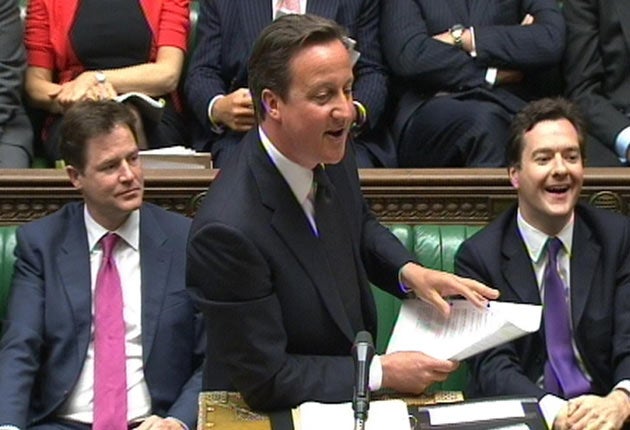Cut out the Flashman act, aides tell David Cameron

Your support helps us to tell the story
From reproductive rights to climate change to Big Tech, The Independent is on the ground when the story is developing. Whether it's investigating the financials of Elon Musk's pro-Trump PAC or producing our latest documentary, 'The A Word', which shines a light on the American women fighting for reproductive rights, we know how important it is to parse out the facts from the messaging.
At such a critical moment in US history, we need reporters on the ground. Your donation allows us to keep sending journalists to speak to both sides of the story.
The Independent is trusted by Americans across the entire political spectrum. And unlike many other quality news outlets, we choose not to lock Americans out of our reporting and analysis with paywalls. We believe quality journalism should be available to everyone, paid for by those who can afford it.
Your support makes all the difference.One is a former public schoolboy bully who went on to serve his country with dubious distinction. The other is the Prime Minister.
David Cameron is to try to rid himself of his "Flashman" image by being more polite to MPs during Prime Minister's Questions. Mr Cameron's senior aides have told him the characterisation of the Prime Minister as the fictional schoolboy bully Flashman from Tom Brown's Schooldays is gaining resonance with the public.
As a result Mr Cameron will try to give his Commons performances a "makeover" so they are "less aggressive" and "more prime ministerial". The move has been triggered by a series of recent incidents when the Prime Minister appeared to lose his temper in the House.
In March, he told the shadow Chancellor Ed Balls to "shut up" and "listen to the answer" during an exchange on enterprise zones. Mr Balls had been taunting Mr Cameron from the opposition benches, shouting "You're not briefed, you're not briefed" – but that was not picked up by the television microphones. Instead all viewers heard was Mr Cameron's retort.
Labour accused the Prime Minister of losing his cool under pressure. In the same session, Mr Cameron also brushed off a question from the Labour MP Chris Williamson by saying he had "no idea" who he was.
The Derby North MP had called for a personal apology from Mr Cameron, who he said had accused him of misleading people in an election leaflet. "I can't believe I accused him of anything because I had absolutely no idea who he was," Mr Cameron said, rather too gleefully.
But the incident which caused most concern in Downing Street was his "calm down dear" jibe aimed at the Labour MP Angela Eagle at the end of last month. Ms Eagle had been heckling Mr Cameron as he attempted to read a quote from the former Labour MP Howard Stoate, backing the Government's NHS reforms. He claimed Mr Stoate had been defeated at the last election by a Conservative candidate when – as Ms Eagle pointed out – Mr Stoate had in fact stood down.
To cheers from his own benches, Mr Cameron shouted at the Wallasey MP: "Calm down, dear, calm down. Calm down and listen to the doctor." Within minutes, Labour had accused him of being "sexist, patronising, insulting and un-prime ministerial".
Part of the problem is that, despite a year of answering questions at PMQs, Mr Cameron does not regularly watch recordings of himself performing. On one recent occasion when he did watch a session, he was said to have been shocked at the "shouty" way he came across.
He told aides he found it very difficult not to raise his voice because of the background noise in the chamber, something not picked up by the television cameras. After the "calm down dear" incident, he is said to have come out of the chamber and admitted he made a mistake.
Mr Cameron has been working on a new strategy for PMQs with his briefing team, which includes the Chancellor George Osborne, the Education Secretary Michael Gove and other senior Downing Street staff.
A Downing Street source said: "There is a realisation that it's just not working. We're not winning enough. The Flashman image is very damaging and we need to address it before it becomes an accepted stereotype."
The source said they were partly using Tony Blair as an inspiration for future performances.
"He was always very effective – especially at using the advantage of office. The Prime Minister always has the last word and we should be using that more."
'A scoundrel, a liar, a cheat'
The fictional character Flashman began life as the notorious bully of Rugby Boys' School class of 1857 in Thomas Hughes's semi-autobiographical book Tom Brown's Schooldays.
Flashman eventually disappears from Hughes's story after he is excluded from Rugby for drunkenness.
The schoolboy tormentor then returns to the literary world through the historical novel series of the same name. The Flashman Papers, by George MacDonald Fraser, acknowledge Hughes's bullying Flashman as the younger version of Sir Harry Paget Flashman, now an "illustrious Victorian soldier".
Despite experiencing many 19th-century wars and adventures and rising to a high rank in the British Army, he remains true to Flashman's original essence: "a scoundrel, a liar, a cheat, a thief, a coward – and oh yes, a toady".
Join our commenting forum
Join thought-provoking conversations, follow other Independent readers and see their replies
Comments